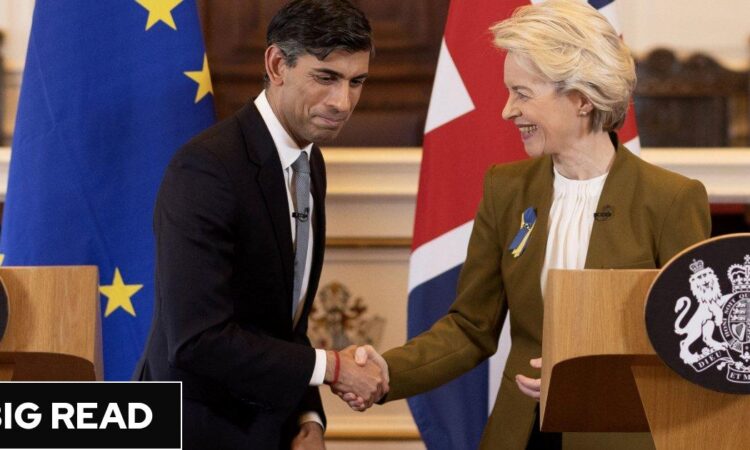
Britain could end up stuck with a “Brussels effect” where UK law ends up mirroring the EU’s indefinitely, Rishi Sunak has been warned as he struggles to push through an overhaul of the regulatory system.
The Prime Minister is under fresh pressure from a new group of Conservative MPs, launched this week, which is pushing for a stronger framework to hold unelected regulators accountable for the post-Brexit powers they wield.
Meanwhile, independent experts and Brexiteer activists alike have cast doubt on whether the UK will ever be able to move definitively away from the EU’s legal orbit, with political and economic pressures pushing ministers towards an endpoint where Britain keeps much of the law it inherited from Brussels after leaving the bloc.
The Retained EU Law Bill, which is currently passing through Parliament, states that all legislation which originated from the EU will be automatically revoked at the end of this year unless ministers actively choose to keep it.
Its progress has been delayed as the Government battles against Opposition attempts to amend the bill, for example to exempt environmental protection regulations from its scope. The legislation is expected to return to the House of Lords for further debate on 15 May but Opposition sources say they have had meetings with ministers cancelled and are still waiting for a string of reports by individual Whitehall departments on which EU laws they are expecting to end up preserving.
The Government has rejected claims it is preparing to change the “sunset clause” so that the moment when EU regulations automatically expire is postponed beyond December 2023. A No 10 spokesman said: “The deadline we have set remains, and we want to deliver on the commitment to remove the burdens of retained EU law.”
Supporters and critics of the legislation alike characterise the bill as a bid to speed up the pace at which civil servants have been reviewing the regulations Britain inherited from its EU membership. Jill Rutter, a former senior civil servant who is now a fellow at the Institute for Government, told i: “The Retained EU Law bill is an attempt to kick Whitehall and ministers into forcing them to look at the whole mass of law that was transferred over.”
But she warned that its long-term effect may prove limited, partly due to businesses’ desire to avoid having to follow two different regimes in the UK and EU, and partly because of ministers’ political commitments to keep a large number of existing rules. “On a huge swathe of things the Government has said it will not lower EU standards, like the environment,” Ms Rutter said. “The same, I think, will apply whenever they get on to looking at workers’ rights.”
She added: “The big problems for the UK on divergence, especially on things like product standards, is that ultimately businesses really want you to align with one of the big regulatory superpowers.” She pointed to a few areas, such as banking where a separate Financial Services and Markets Bill is rewriting the regulatory framework, where the UK can forge its own path: “Financial services are the market where we can be a big player and we can do things differently. There could be a ‘London effect’ that overcomes a ‘Brussels effect’, but on more bog-standard product regulations there will be a Brussels effect.”
Joel Reland of UK in a Changing Europe agreed, saying: “The consistent theme is there has been very little substantive change. There’s loads and loads of promises, but what we have seen is very little difference to what we had before.” He added: “What we might see is a position where ministers effectively reinstitute all that retained EU law, but with a different name. If you can demonstrate sovereignty without having to disturb too many stakeholders, that may be the sweet spot for Rishi Sunak.”
The Prime Minister in practice is trying to be selective about where to diverge from the EU, Mr Reland said, for example by commissioning Sir Patrick Vallance, who was until recently the Government’s chief scientific adviser, to review regulations in a handful of key “growth sectors” such as life sciences and digital technology. Sir Patrick has called for the UK to create “regulatory sandboxes” where new technologies can be tested in a light-touch regime – but he has also warned that eventually Britain will end up having to align its rules with the EU and US, saying recently that “convergence becomes important as technologies mature”.
Some veterans of the Boris Johnson administration fear that Mr Sunak and his ministers will fail to use the powers available to them to build a new system of regulation tailored for the needs of the UK. One insider said: “Lots of ministers have been unwilling to push their departments on this. Departments have got a bit ‘rabbit in the headlights’ and tried to retain all the EU law.”
Pushing through significant reforms, including in totemic areas such as workers’ rights, before the general election will be crucial to ensuring that Labour cannot simply undo the Conservatives’ legacy, the source said – adding: “What I’m worried about is that there will just be a lack of ambition in terms of total numbers of reforms. People in the Cabinet seem a bit embarrassed by this bill.”
Current Government insiders are adamant that over time the UK will move away from the EU’s ambit. A Whitehall source told i: “With every waking second, we are diverging from the European Union because they are passing regulation after regulation and we are not following them.”
But the Regulatory Reform Group (RRG), a new alliance of Tory MPs aimed at sharpening Britain’s system of regulation, has warned the bodies needed to enforce the rules are not yet up to the task.
Bim Afolami, the MP for Hitchin and Harpenden who is the group’s chairman, said: “Why is the system constantly creating crap outcomes? Either it is the people, which I don’t believe, or it is because we don’t have the right system.” In its first report the RRG recommends establishing a joint committee of MPs and peers to oversee the work of regulators, as well as a dedicated unit to co-ordinate the regulators inside the Cabinet Office.
Regulation should be “outcomes-based”, policing the real-world effects of how businesses operate, rather than focussed on compliance with complex box-ticking exercises, the report concludes. Mr Afolami urged colleagues to wake up to the importance of making Whitehall work more efficiently, saying: “It is a plumbing thing, but I think plumbing really makes a difference to your enjoyment of a house. You can paint a room and decorate it with the perfect furniture, but if the pipes burst it’s ruined.”







